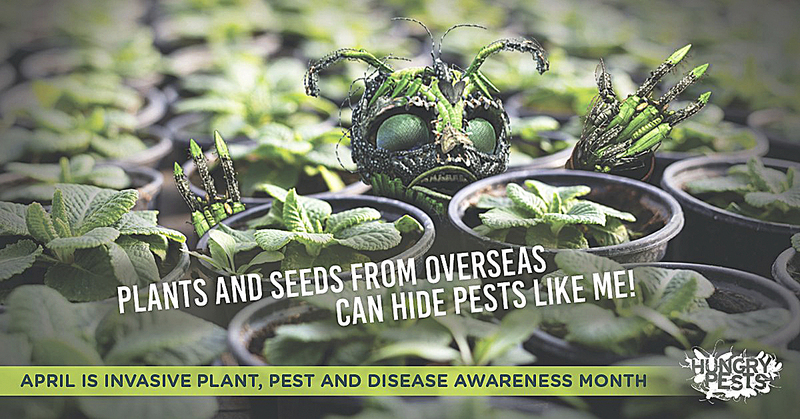
Invasive Plant Pest and Disease Awareness Month
The United States Department of Agriculture (USDA) declared April 2022 Invasive Plant Pest and Disease Awareness Month (IPPDAM). This month is dedicated to “highlighting the impact invasive plant pests and diseases have on plant health nationwide”, according to Suzanne Bond and Cecilia Sequeira of the Animal and Plant Health Inspection Service, which is part of the USDA. Bond and Sequeira also highlighted that another purpose of the month is to educate Americans about the simple actions they can take to help reduce their spread (of invasive plant pests and diseases). Invasive Plant and Pest Disease Awareness Month (IPPDAM) was established with the purpose to raise public awareness about the threat. Invasive plant and pest diseases can devastate livelihoods, food security, and forests.
Many invasive pests and diseases are what Bond and Sequeira call “natural hitchhikers”. This phrase is used because it is easy for people to unintentionally move the pests and diseases to new areas. Moving them introduces them to an area where they are nonnative. One example of how this could happen would be a situation where they are hiding in untreated firewood. They could also attach themselves to outdoor gear and vehicles and be unintentionally moved to an unwanted place. The pests may also be transported unintentionally through agricultural materials such as soil, homegrown produce, seeds, and plants.
Unfortunately, invasive pests have few or no natural predators in a nonnative environment, meaning they can easily and quickly spread. Bond and Sequeira explained that the pests will disrupt the nonnative ecosystem by pushing out native species and reducing biological diversity. Weather can magnify the impact of the pests and diseases. Because of this, climate change has increased the level of plant pest and disease infections. This has allowed pests to produce more generations each year as well as extended the suitable habitat for plant pests. Despite these uncontrollable factors, there are ways that we can help protect plant health. Protecting plant health protects our farmers and their livelihoods. Here’s how you can help…
Bond and Sequeira (Animal and Plant Health Inspection Service, USDA) provided the following information on what we can do to help protect our environment from invasive pests and diseases.
Become familiar with invasive pests and diseases in your area. Know the signs of their infestation.
If you discover signs of new invasive plant pests and diseases, report them to the local state department of agriculture or the USDA State Plant Health Director’s Office. Illinois’ Department of Agriculture can be contacted via phone at (217) 782-2172. Illinois’ State Plant Health Director is Greg Rentschler, who can be contacted through email at Greg.J.Rentschler@usda.gov or by phone at (847) 699-2422.
Be aware that untreated firewood might not be pest-free even if it looks that way. If at all possible, do not move it and use local firewood or certified heat-treated firewood.
Source plants and seeds responsibly. Do not assume that plants and seeds ordered online from foreign retailers have gone through the proper import processes.
Do not mail homegrown plants, fruits, and vegetables to anywhere not local. You may accidentally mail a pest with the plant, fruit, or vegetable being shipped.
If you are unsure, you can always reach out to the local USDA State Plant Health Director’s Office to find out what to do before buying seeds or plants from an international vendor or before mailing homegrown plants. The contact is to Greg Rentschler, his information is listed above on #2.
Having a month to spread awareness for invasive plant pests and diseases is important because plant health is critical to our food security and the livelihood of so many people. The USDA also provided materials to help educate children on the topic. Children that participate in the activities learn how to identify pests, the damage that the pests cause, and how they can help reduce their impact. The materials can be found at https://www.usda.gov/media/blog/2020/04/15/celebrating-invasive-plant-pest-and-disease-awareness-month-your-children.